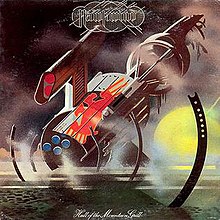Lost Johnny
| Hall of the Mountain Grill | ||||
|---|---|---|---|---|
 |
||||
| Studio album by Hawkwind | ||||
| Released | 6 September 1974 | |||
| Recorded | Edmonton Sundown (January), Olympic Studios (May–June), London 1974 | |||
| Genre | Space rock, progressive rock, psychedelic rock | |||
| Length | 41:24 | |||
| Label |
United Artists (most of the world) Liberty (Japan) Parlophone (2015 reissue) |
|||
| Producer | Roy Thomas Baker, Doug Bennett, Hawkwind | |||
| Hawkwind chronology | ||||
|
||||
| Professional ratings | |
|---|---|
| Review scores | |
| Source | Rating |
| Allmusic | |
| Head Heritage | (Mixed) |
Hall of the Mountain Grill is the fourth studio album by space rock band Hawkwind, released in 1974. It is regarded by many critics as a career highlight (in studio). This album signalled the introduction by the band of more ambient and melodic tracks, or parts of tracks than we were used to. By doing so, the band demonstrated that they were in fact extremely adaptable, and not the "Status Quo" of acid rock previous offerings may have implied.
The group's fourth studio album, it was the first by a new line-up that included Simon House on synthesizer, Mellotron and electric violin; absent were Robert Calvert, who had previously contributed lyrics, vocals and spoken word interludes, and Dik Mik, who provided electronic effects.
The album's title was a nod to Edvard Grieg's "In the Hall of the Mountain King" and to a Portobello Road cafe called The Mountain Grill (now closed), frequented by the band in the early 1970s. The cover of a derelict spaceship in the mists of an alien lagoon was painted by the band's regular artistic collaborator, Barney Bubbles. The rear cover was by space artist David Hardy.
The record featured hard rockers like "The Psychedelic Warlords (Disappear in Smoke)" and "Lost Johnny" (subsequently recorded by bassist Lemmy's post-Hawkwind band Motörhead and also by co-writer Mick Farren with his band The Deviants), psychedelia such as the heavily phased "D-Rider" and "Web Weaver", as well as quieter atmospheric numbers like the instrumentals "Goat Willow", "Wind of Change" and the title track. Side two of the original vinyl LP was bookended by "You'd Better Believe It" and "Paradox", live tracks recorded at the Edmonton Sundown in January 1974, that recalled the 'space jams' of earlier releases.
...
Wikipedia
